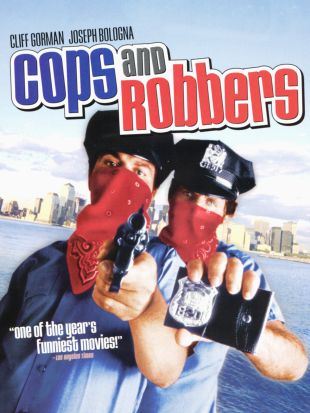
Aram Avakian didn't enjoy an especially prolific career as a film director (he had significantly more extensive credits as an editor for both movies and television, and taught filmmaking in his later years), but he certainly made a mark with the few movies he did make, particularly his darkly comic countercultural piece End of the Road and the clever, well-crafted heist drama 11 Harrowhouse. 1973's Cops and Robbers is one of Avakian's most enjoyable and accessible pictures, but while it's an often funny look at two working-class guys trying to pull off a big score, it's also the sort of gritty crime flick that they don't make anymore, shot on the streets of New York City before gentrification set in, when it was among the dirtiest and most dangerous great cities in the world.
Cops and Robbers opens as a cop named Joe (Joseph Bologna) is walking his beat in a run-down neighborhood. Joe stops into a liquor store and begins talking to the clerk behind the counter, a moment before he draws his gun. Joe walks away with a couple hundred bucks in his pocket and the manager of the store wondering what the hell just happened. Joe and his best friend, Tom (Cliff Gorman), have both spent years working for the NYPD -- Tom is a detective, though that doesn't mean much in terms of added pay or prestige -- and they often feel like they're being played for suckers, putting their lives on the line for low wages and protecting citizens who would just as soon they got lost. When Joe confesses to Tom that he robbed the liquor store while on duty, Tom is intrigued, and after talking about the criminal possibilities presented to them as cops, they decide they should put their knowledge to use, pulling off a robbery that would leave them set for life. An underworld boss who calls himself Patsy O'Neill (John P. Ryan) is brought in one day, and Tom copies down his home address and stops by his house with a proposal -- he'd like to make an arrangement to steal something that O'Neill would be willing to buy for two million bucks. O'Neill freely admits he's sure someone is playing a prank on him, but he goes along, telling Tom that he could move ten million in bearer bonds and would be willing to pay 20 cents on the dollar. Tom and Patsy strike a deal, and he and Joe make a plan to steal the bonds from a major Wall Street brokerage house while the Apollo 11 astronauts, just returned from the moon, are given a ticker-tape parade that runs past the building. Of course, the perfect plan turns out to be less than perfect, but the cops also turn out to have criminal instincts as keen as any gangster.
Cops and Robbers was written by Donald E. Westlake (who adapted his own novel), and while the dialogue is often quite funny, it comes from characters who are edgy and pissed off, and it captures the bitterness and cynicism of New York at a time when Watergate was on the horizon, crime was exploding, and the city was starting to crumble. Joseph Bologna and Cliff Gorman are pitch-perfect as Joe and Tom, who don't present themselves as either heroes or villains -- they're just frustrated working stiffs who figure that it's time they got a piece of the action in a world that's drowning in corruption before they become another cop shot on duty. The film also has an excellent supporting cast, including Ryan as the gangster with a bowling alley in his basement, Joe Spinell as his fashion-challenged henchman, Shepperd Strudwick as a stockbroker who has some ideas of his own concerning the robbery, and Ellen Holly, who is cool, wary, and sexy as his secretary.
However, it's cinematographer David L. Quaid and director Avakian who really make Cops and Robbers something special. Quaid captures the funky details of New York City in the 1970s -- the artless graffiti, the crumbling buildings, the peeling paint of the police station, the shabby suburbs with their above-ground swimming pools -- with an eye that's part artist and part anthropologist, while Avakian gives this movie a easy but assured pace that's a solid match for the alternately laid-back and angry vibe of his protagonists. Cops and Robbers is an overlooked gem that, without succumbing to willful eccentricity, still represents the sort of daring, streetwise filmmaking that made the early to mid-'70s a golden age for American auteur filmmaking.
